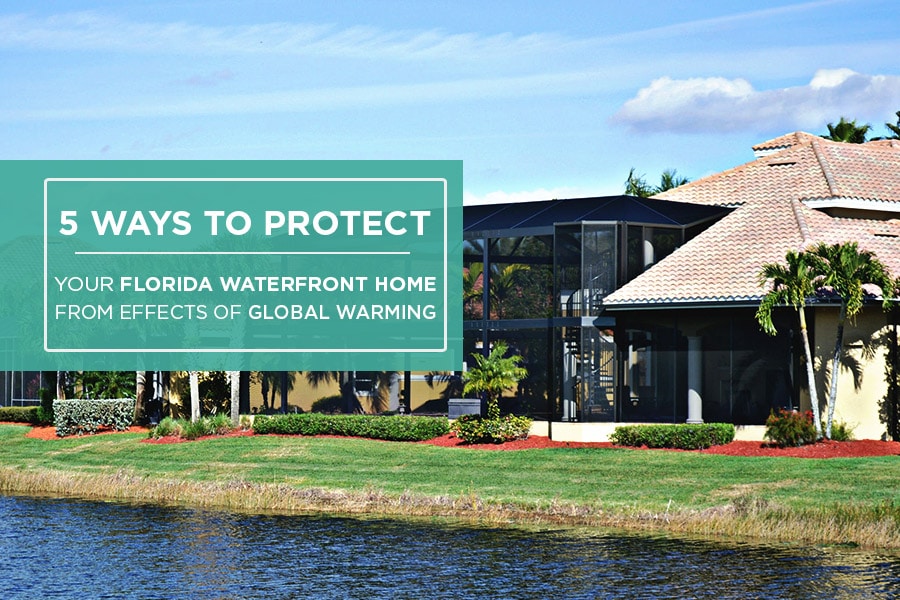When I moved to Florida a few years ago I knew about global warming and climate change. It’s impossible not to know. I wasn’t sure how much it would be affecting my life, lifestyle or property. I read as much as I could and I must be honest, it didn’t impact on the home that I built in Florida or where I built it. It impacted in other ways which I will touch on below.
Global warming is real and global warming is affecting Florida. Sea levels are rising, there are more floods, more mudslides, and more fires. You don’t want to build a home if it’s going to drop into the ocean or if it’s in a fire hazardous area. You do need to take global warming and potential disaster into account when you build and have a serious look at what precautions have been put in place.
(https://news.nationalgeographic.com/2017/07/sea-level-rise-flood-global-warming-science/)
I had wanted a home near the water and that is what I did – I bought one with a view and I refurbished it. I am so glad I did because I absolutely love it. I did take some things into account though:-
5 things to think about with global warming and a Florida waterfront home
-
Global warming is real
We have all seen the video footage of recent floods, in the USA, England, China, Malaysia, Australia and South Africa. There have always been floods with seasonal changes but floods today do seem extreme. For this reason, people are often cautious to build on low lying land or near the coast. Always ask your realtor if the house you are buying or building has been through any natural disasters. Ask if there has been previous flooding or natural disasters. You have a right to know. Check out your area.
-
Buying near the coast
I think life is short and if you want to live by the coast, live by the coast. I had dreamed of a water view and now I have one. I couldn’t be delighted when I wake up in the morning and see the ocean. But – buy in an area that has a pro-active municipality or residents association. Know that if your area is in a potential risk area, they are good pumps, flood barriers, escape routes (haha hope you never need these) and a community that is active and will assist one another if necessary.
-
Look at elevation
Of course, you should build near the coast! Of course. But elevate your home if you can. Try and lift it above what would be the possible height of the floodwaters. You can build on stilts, you can build on a raised platform or you could go treehouse style. There are many beautiful contemporary and enchanting ways to build high. Build high if you’re living on the edge of the water or close by. Global warming is affecting Florida so be aware of being a little bit high.
-
Build a floodwall
You can build an ordinary home (that would be mine) but build a floodwall that will protect your home from crashing waves or a flooding river. Some people build a perimeter wall with gates that are watertight. Others use berms and walls and incorporate them into the landscaping. There are lots of things you can do with an engineer. You can protect your house while flooding the garden. Talk to an architect or an engineer and get ideas.
-
Make your house watertight with dry waterproofing
You can do this. You can flood-proof doors, walls, and windows. Dry waterproofing is all about keeping the water out of the home. There are things called storm doors and storm windows. This technology may be out of your budget but you might find it possible. Raise your utility entry points. Seal them too. Do whatever you can to make your house watertight and work with a professional on this.
-
For the wet floodproofing approach
Let’s say you know the water is going to get in your house. You’ve done as much as you can but you still think in a Category 5 hurricane your house will get damaged. Minimise the damage. Don’t use wood for flooring, rather use concrete. Put your power outlets high up a wall, still so you can reach them but high enough so they won’t be damaged by water. And if you have a swimming pool, chat to an engineer to see if water can be directed away from the house and into the pool.
-
A floating home
If I was starting all over again, I might consider this. Houseboats that are moored and floating homes are gaining in popularity. If your house can float, you are always going to be on top of the floodwaters. This sounds a bit like Noah and his Arc but there are astonishing floating homes so check these out too.
- I said in the opening paragraph of this article that I do what I can regard to global warming. I can’t reverse climate change on my own, but I can do small things. I never use plastic. I recycle. I try and grow enough vegetables to ensure I am self-sufficient and that hasn't quite worked yet but I am trying. I conserve energy where possible, I am always careful with water and I watch my carbon footprint. I live well, I want to and we all deserve to, and I certainly don’t let the idea of disaster and catastrophe impinge on the way I live, but I do try and be prepared and I do try and do my little bit.
If you have any thoughts on how global warming is affecting Florida I would love to hear them. We live in interesting times and there are many interesting discussions to be had.
(https://www.nytimes.com/2016/11/24/science/global-warming-coastal-real-estate.html


Thanks for your this thoughtful article!
Glad you found it helpful.